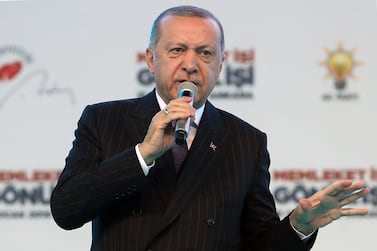Greek Prime Minister Alex Tsipras visited Turkey’s President Recep Tayyip Erdogan, as Ankara put a bounty on eight former Turkish soldiers now in Greece.
Ties between the two countries have long been strained by historic divisions over Cyprus, energy resources and territorial disputes.
Mr Tsipras’s visit came on the same day Ankara announced the 4 million Turkish lira (Dh2.8 million) bounty for each one of the eight Turkish officers accused of trying to overthrow Mr Erdogan’s government in 2016.
The men fled to Greece seeking asylum, where Mr Tsipras said the country’s judiciary would determine their fate, not Turkey.
The leader also made a symbolic trip to Istanbul’s Hagia Sophia, once a Greek Orthodox cathedral, on Wednesday.
Mr Tsipras also attended Mass at the Greek Orthodox Halki Theological School on one of Istanbul’s Prince’s Islands, which has been closed since 1971.
Greece hopes that the Turkish government will reopen the school for priests to receive training.
The school is yet another sticking point between the two countries.
The EU has put pressure on Turkey to reopen the institution, as did former US president Barack Obama.
Mr Erdogan has suggested that its reopening depends on reciprocal action from Greece to improve the lives of the country’s Muslim minority.
But Mr Tsipras’s rivals say his visit is badly timed.
“This visit is poorly prepared by the Greek side and augurs ill for Greek interests and Greek-Turkish relations,” opposition MP Yiorgos Koumoutsakos said.
Mr Tsipras and Mr Erdogan discussed territorial and airspace disputes.
Athens angered Ankara last October after then foreign minister Nikos Kotzias announced plans to extend Greece’s territorial waters to 12 nautical miles.
Greece and Turkey have regularly traded threats over a number of disputed islands in the Aegean Sea, many of which are just kilometres from the Turkish coast.
Access to lucrative undersea resources is another contentious issue causing aggravation between the two neighbours. Turkey says it wants to explore the seabed near its coast for oil.
Greece claims that doing so would breach their continental shelf, an area that can extend beyond territorial waters and in which countries have the right to exploit natural resources.







